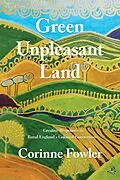Selected by Bernardine Evaristo as an Observer Best Books 2021
Green Unpleasant Land explores the repressed history of rural England's links to transatlantic enslavement and the East India Company.
Combining essays, poems and stories, it details the colonial links of country houses, moorlands, woodlands, village pubs and graveyards. It also explores the links between rural poverty, particularly enclosure, and colonial figures, such as plantation-owners and East India Company nabobs. Fowler, who herself comes from a family of slave-owners, argues that Britain's cultural and economic legacy is not simply expressed by chinoiserie, statues, monuments, galleries, warehouses and stately homes. This is a shared history: Britons' ancestors either profited from empire or were impoverished by it. Green Unpleasant Land argues that, in response to recent advances in British imperial history, contemporary authors have reshaped the pastoral writing to break the powerful association between the countryside and Englishness.
Autorentext
Professor Corinne Fowler is a research expert at the University of Leicester, and is Director of Colonial Countryside: National Trust Houses Reinterpreted. She specialises in the legacies of colonialism and postcolonialism to literature, heritage and representations of British history. She is the author of Green Unpleasant Land.
Klappentext
Green Unpleasant Land explores the countryside's repressed colonial past and demonstrates its importance as a source of ideas about Englishness. The book presents historical evidence to show that rural England was a place of conflict and global expansion. It also examines four centuries of literary response to explore how race, class and gender have both created and deconstructed England's pastoral mythologies. In particular, the book argues that Black and British Asian writers have challenged narrow, nostalgic views of rural England but also expressed attachment to English landscapes and the natural world.
